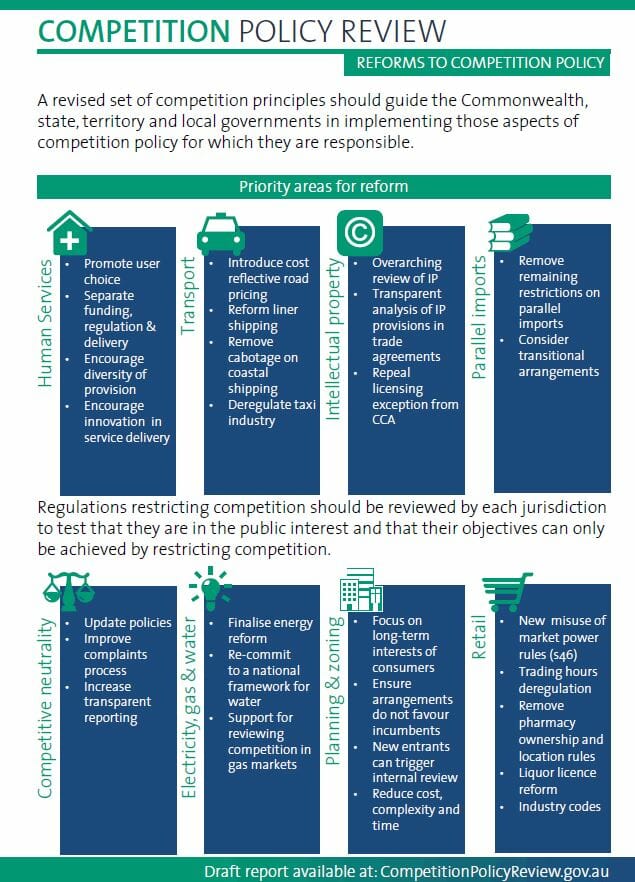
The Competition Policy Review Draft Report has been published for comment.
The Review’s Terms of Reference required an assessment of Australia’s competition policies, laws and institutions to determine whether they remain fit for purpose, especially in light of the opportunities and challenges facing Australia into the foreseeable future.
The draft report includes 52 draft recommendations for:
- priority areas of reform in competition policy;
- changes to the Competition and Consumer Act 2010 (CCA);
- changes to the regulatory structure;
- addressing the concerns that small businesses raised;
- retail markets, in particular supermarkets and pharmacies. It also discusses restrictions on retail trading hours.
This graphic summarises the policy review (click to enlarge).
Priority areas of regulatory reform
In addition to the continuation of electricity and transport reforms the Review Panel has identified the following priority areas for reform :
• taxi licences (Draft Recommendation 6);
• intellectual property (Draft Recommendations 7 and 8);
• parallel import restrictions (Draft Recommendation 9);
• planning and zoning rules (Draft Recommendation 10);
• restrictions on retail trading hours (Draft Recommendation 51); and
• pharmacy ownership and location rules (Draft Recommendation 52).
Changes to the Competition and Consumer Act 2010
The draft report recommends that the competition law provisions of the CCA (including the cartel provisions) should be simplified, including by removing overly specified provisions, which can have the effect of limiting the application and adaptability of competition laws, and by removing redundant provisions.
The recommendations include:
- Repeal of the ‘price signalling’ provisions of Division 1A of the CCA in their current form . Section 45 should be extended to cover concerted practices which have the purpose, or would have or be likely to have the effect, of substantially lessening competition.
- Re-drafting the primary prohibition in section 46 to prohibit a corporation that has a substantial degree of power in a market from engaging in conduct if the proposed conduct has the purpose, or would have or be likely to have the effect, of substantially lessening competition in that or any other market. However, the Panel is concerned to minimise unintended impacts from any change to the provision that would not be in the long-term interests of consumers, including the possibility of inadvertently capturing pro-competitive conduct. To mitigate concerns about over-capture, the Panel proposes that a defence be introduced so that the primary prohibition would not apply if the conduct in question would be a rational business decision or strategy by a corporation that did not have a substantial degree of power in the market and the effect or likely effect of the conduct is to benefit the long-term interests of consumers. The onus of proving that the defence applies should fall on the corporation engaging in the conduct.
The Review Panel Found there is not a strong case that the current unconscionable conduct provisions are not working as intended to meet their policy goals.
This 3 minute video from Panel member Michael O’Bryan QC reviews the legal issues:
Regulatory structure
The draft report recommends that competition and consumer functions should be retained within the single agency of the ACCC. But the ACCC’s governance should be reviewed and the ACCC should also develop a Code of Conduct for its dealings with the media with the aim of strengthening the perception of its impartiality in enforcing the law.
Access and pricing regulator functions should be transferred from the ACCC and be undertaken within a single national access and pricing regulator
Small business
The Panel invites views on whether there should be a specific dispute resolution scheme for small business for matters covered by the CCA.
Retail markets
The Panel recommends that remaining restrictions on retail trading hours be removed. To the extent that jurisdictions choose to retain restrictions, these should be strictly limited to Christmas Day, Good Friday and the morning of ANZAC Day.
The Panel considers that the pharmacy ownership and location rules should be removed in the long-term interests of consumers. They should be replaced with regulations to ensure access and quality of advice on pharmaceuticals that do not unduly restrict competition.
The Final Report will be submitted to the Australian Government by March 2015.


